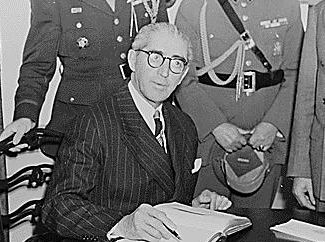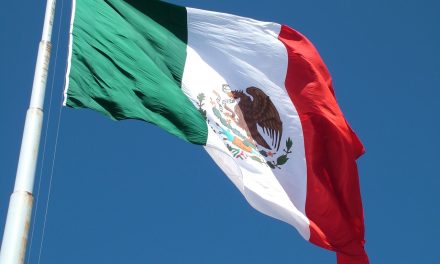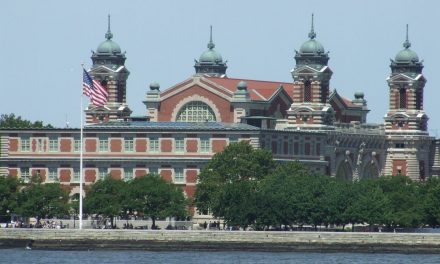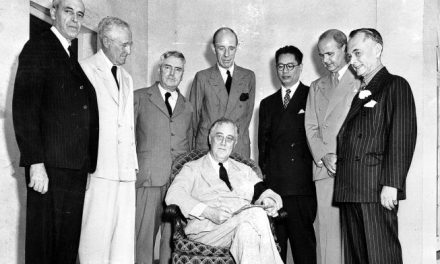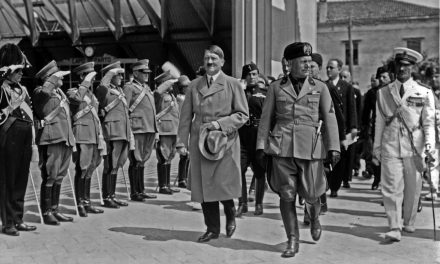Chile’s president, Juan Antonio Rios, announced today that the country had suspended relations with Germany, Italy and Japan. In a radio broadcast to the Chilean people, Rios explained his plans to support the Allied nations.
He said Chile would devote resources, such as its rich mineral supply, to the effort and aid in the manufacture of war materials. According to Rios, the decision to disassociate from the Axis powers was born out of a dedication to showing solidarity with the Americas and the spirit of democracy.
“We are fighting so that all men and nations may live in peace,” he said.
Rios added that the lives of Germans, Italians and Japanese living in Chile would not be disturbed as long as these individuals did not attempt espionage.
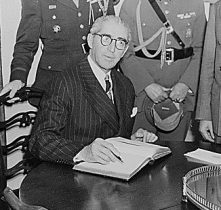
President Juan Antonio Rios of Chile, who announced his country’s support of the Allied nations on January 20. Photo by Abbie Rowe. From Harry S. Truman Library, National Archives and Records Administration.
Even though the country’s population includes an estimated 20,000 Germans, 12,000 Italians and 700 Japanese, life seems to be continuing as normal for all. Reports say that crowds still gathered around newsstands to read the Nazi newspaper, Supplemento, the day after the policy change.
Both the Chilean news media and the public at large celebrated the break with the Axis powers as a wise decision. Even publications such as Supplemento chose to praise Rios for his promise not to harm Italian, German or Japanese civilians. In addition, Chilean citizens reportedly cheered aloud during various points in Rios’ speech.
With this decision, Chile joins a number of Latin American counties that have declared their support for the Allies, including Brazil, Mexico and Bolivia.
Some nations, such as the Dominican Republic, Nicaragua, Costa Rica and Cuba took their support for the allied nations to the battlefield, declaring war on Germany and Italy just four days after the attack on Pearl Harbor.
In fact, Nicaragua readied itself for war a mere two days after the attack on the US. In a special session on Dec. 9, 1941, the Nicaraguan Congress gave its president authorization to declare war on any non-American government that attacked any country in the Americas.
On the day Rios announced his support for the allied cause, many foreign diplomats welcomed the news at a meeting with the diplomatic corps in Chile, which excluded the Axis nations.
In particular, the Peruvian ambassador said that Chile’s move to support democracy will help make the Americas stronger as a unit.
“We gladly witness Chile’s decision because it brings the country into line with Peru and others who broke off months ago in cooperating with the cause of democracy,” the ambassador explained.
However, despite having widespread support both nationally and internationally, Rios’ decision was met with some backlash.
The Argentinean ambassador, Carlos Guiraldes, reportedly walked out of the corps meeting with a serious look on his face and declined to comment on the issue. Reports circulated that, when Guiraldes met with Rios on Jan. 15, he tried to persuade Rios to remain neutral to no avail.
Chile’s decision leaves Argentina as the last nation in the Americas in which Axis agents are allowed. The likelihood is that agents, formerly residing in Chile, will now migrate to Argentina. This possible scenario is reportedly disquieting to the country’s officials as they are trying to remain neutral in the conflict. In addition, Argentina is facing increased social pressure from other Latin American nations to join the Allied cause out of solidarity.
Given its geography, the decision on the part of Chile’s leaders to support the Allies was reportedly a long-debated topic.
Without the means to fully protect its expansive coastline, Chile feared retaliation from the German or Japanese navy if they were to side with Allied forces. While reports say that Chile’s fear subsided as Axis forces were continually directed away from them, the country still risked an attack.
Rios’ willingness to defend his belief in democracy, despite the potential cost, demonstrates the powerful effect of this conflict. He explained that now is not a time to focus on individual needs.
“No nation and no individual can look with isolated indifference on the war,” he said in his national broadcast.
Sources:
“CHILE BREAKS TIES WITH AXIS POWERS: President Rios Says Time Has Come to Give More Ample Support to Democracy EXCITING DAY IN COUNTRY Latin-American Diplomats Hail Decision — Santiago Now Seeks Envoys’ Return.” New York Times, January 21, 1943, p. 8.
“Chile’s Break With Axis Marks Trend of Times.” Los Angeles Times, January 21, 1943, p. A4.
“CHILE SEEN REBUFFING PLEA BY ARGENTINA: Envoy Said to Have Argued Vainly Against Break With Axis.” New York Times, January 16, 1943, p. 4.
“Chile Strikes at Axis Spies: Alien Residents Pledged They Won’t Be Molested if War Laws Obeyed.” Los Angeles Times, January 22, 1943, p. 4.
“LATIN NATIONS JOIN IN WAR ON ITALY, GERMANY: Cuba, Dominican Republic and Costa Rica Act.” Chicago Daily Tribune, December 12, 1941, p. 7.
“Nazi Paper Still Published.” New York Times, January 22, 1943, p. 5.
“Nicaragua Joins in War.” New York Times, December 10, 1941, p. 13.

